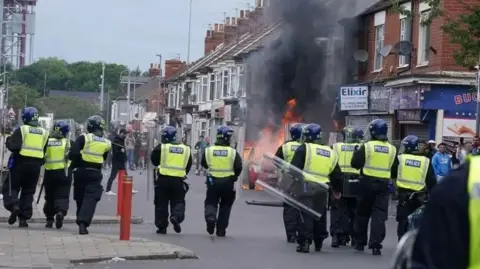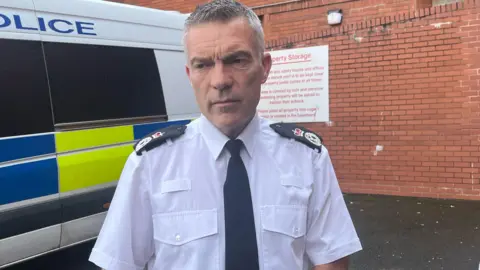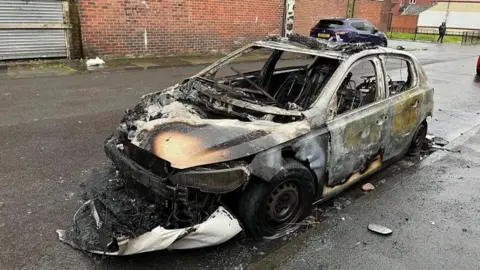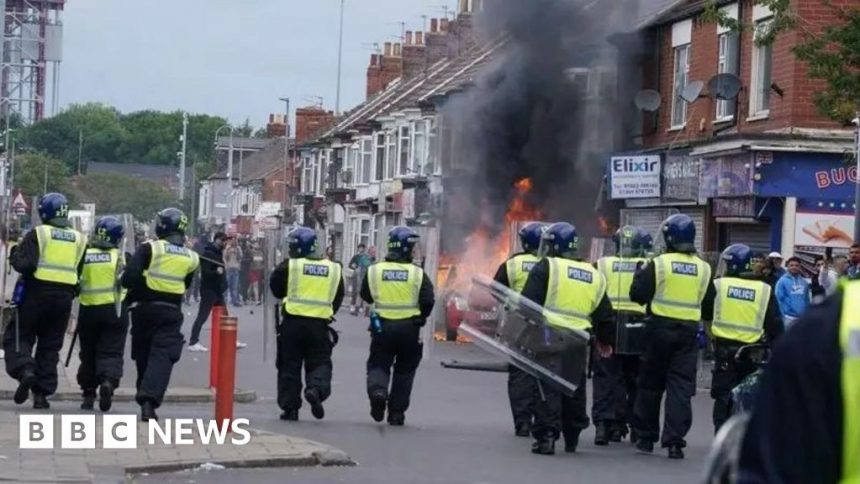Two-tier policing claims are ‘nonsense’, MPs told
 PA Media
PA MediaA police chief has branded claims of two-tier policing “nonsense” as he insisted his officers had been “entirely fair” in the way they responded to the summer riots.
Cleveland Police’s chief constable Mark Webster told MPs “people don’t want to listen to the facts” when asked about the debate, which erupted amid accusations some were getting special treatment from police because of their background.
Violent disorder swept parts of England in July and August in the wake of the Southport stabbings, fuelled by social media misinformation.
Answering the Home Affairs Select Committee, Mr Webster said the “narrative” around two-tier policing was “really unhelpful”, adding: “I go so far as to say sometimes it’s nonsense, and it does tend to undermine.”
He continued: “Without fear or favour if you were involved in criminality, you were arrested, or you will be arrested.”
He insisted his force was “very fair” and stressed that people were arrested when there was “clear evidence” they were suspected of committing violent disorder or other crimes.
People “don’t necessarily want to listen to the facts, and if it doesn’t conform with the view that you want to put across and you want to accuse police of two-tier policing, it does have a really negative effect on my officers”, Mr Webster told the committee.
 PA Media
PA Media‘Challenged communities’
Earlier in the session, Mr Webster said forces did not have the “capability to police the entirety of social media”, adding: “Clearly these entities are far, far bigger than anything policing has got to offer.”
Asked what was behind the riots, Mr Webster said there were “common factors” among the areas where unrest occurred, adding: “Many of them are challenged communities. The social fabric is quite difficult across many of them and I think that probably makes them fairly fertile to be either whipped up or for violence, maybe out of just wanting criminality, boredom, any number of different issues.”
He cited examples of people being sentenced who had “been out, they’d had too much to drink, they’d walk past and thought, why not?”
“That’s not a representative sample, but I think much of that desperation, this lack of hope, lack of state, nothing to lose, I think much of that certainly impacted on the riots and the disorder that took place in Cleveland,” he added.
The cost to Cleveland Police in tracking down those who took part in unrest in Middlesbrough and Hartlepool on Teesside has reached more than £660,000.

Staffordshire Police chief constable Chris Noble told the MPs it did not “make any sense for policing at all to show favouritism whenever we’re built on respect for the rule of the law”.
He added: “If two-tier policing is bringing people swiftly to justice, I’m not quite sure many people would argue with that.”
The allegations were “not nice to hear, but we’ve got relatively thick skin”, he said.
Judi Heaton, chief constable of Humberside Police, told the committee how vital a quickly functioning justice system was to “nip this [the riots] in the bud”, adding: “We couldn’t have a situation where, nationally, we were facing disorder like this, day in, day out, week in, week out.
“So actually, swift justice happening and being seen to happen was really important.”
Ms Heaton, said her force had initially taken a “low-key approach” to policing the disorder but had “never seen anything like it” when violence and looting broke out in Hull.
Jake Richards MP told Ms Heaton he was aware officers had “raised a number of issues” including “members of the Chief Officer Group not being in the region in the days leading to and during the riots”.
In response, the chief constable insisted they “were around” and had worked “continuously”.
Ms Heaton also told the committee she was “not aware” of officers, who had been injured during the disorder, being taken to hospital in taxis or personal vehicles.
Follow BBC Tees on X, Facebook, Nextdoor and Instagram, external. Send your story ideas to northeastandcumbria@bbc.co.uk.





